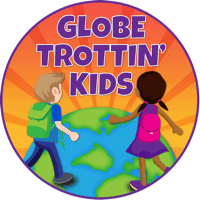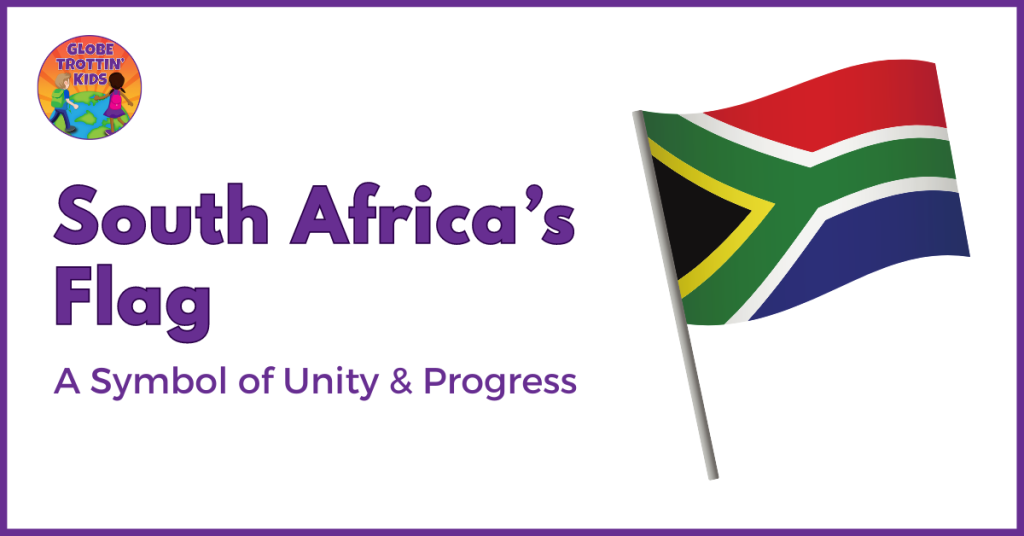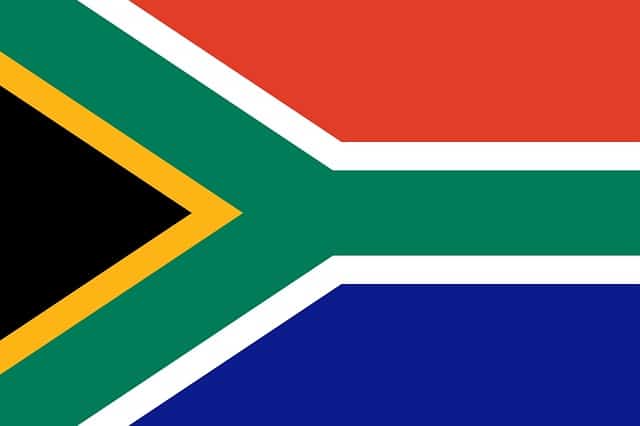

South Africa’s Flag: A Symbol of Unity and Progress
South Africa was at a major turning point in the early 1990s.
Apartheid was coming to an end, a democratic government was being formed, and Nelson Mandela was about to become the first black president of South Africa.
The country needed a new flag to represent its new vision.

South Africa’s New Flag
A public competition was held for the design of the new National flag. Seven thousand designs were received, and several were presented – but none were chosen.
With the country’s first democratic elections approaching, 74-year-old Fred Brownell was asked to design a new national flag – quickly! He had one week to do it. (Luckily, Brownell had been sketching ideas for years.)
South Africa’s new flag was first hoisted during the elections – on April 27, 1994.
Its first official appearance was at the presidential inauguration on May 10, 1994. It became the official symbol of the new democracy and was adopted into South Africa’s new constitution in 1996.
Flag Symbolism
The design of South Africa’s new flag represented the unification of the diverse nation into one democratic state. The “Y” illustrates the convergence and the path ahead.

At the time, it was the only national flag in the world to contain six colors as part of its design.
While officially there is no symbolism to the colors, some thoughts are that the red/orange, white, and blue come from the British and Dutch colonial flags, and the black, gold, and green are from the colors found in the flags of liberation groups, including Nelson Mandela’s ANC (African National Congress) party.
Other theories include…
- the black isosceles triangle: the determination of the black race
- blue: the Atlantic and Indian Oceans or the wide sky overhead; truth, loyalty
- red: the bloodshed during the wars; bravery; strength
- green: fertility of the land; love, hope, and joy for the land
- yellow: the mineral wealth that is below the soil; gold
- white: the white population; honesty; peace
The South African flag is to be displayed horizontally with the black triangle to the left and the red band on the top or vertically (rotated 90 degrees and reversed) with the black triangle at the top and the red band to the left. The flag is to be hoisted briskly and lowered ceremoniously.
People are expected to stand at attention when it is being hoisted and lowered, with their hats off and their right hand over their heart in a salute.
The flag should never touch the ground, never be used to drape over things, and never be used to start or finish a competition or a race.

Flag Nickname
South Africa’s flag doesn’t have a nickname, but suggestions from the public included: Unity Flag, Southern Crane, Southern Union, Oranje Union, Rainbow Salad, Ama Flappa Flappa, Madiba or Madiba’s Rainbow ( Madiba is Nelson Mandela’s clan name), the Mandela Flag, and Nelson.
Most people refer to it as the “Rainbow” flag.
Which do you like? Can you think of another nickname for the South African flag? Does your country’s flag have a nickname?
In addition to the new flag, South Africa created a new national anthem – merging the old official and unofficial anthems.
The lyrics include the five most widely spoken of South Africa’s 11 official languages – Xhosa, Zulu, Sesotho, Afrikaans, and English.
Flag Puzzle Activity

Download the Flag Puzzles . (Black/white and color versions are included.)
- Cut the puzzle pieces on the dotted lines and assemble them.
- Glue on a sheet of paper.
- Color the black and white flag.
- Make your puzzle: Cut out one of the flags. Fold it several times. Unfold it and cut along the fold creases. Reassemble. (The number of times you fold it will depend on the child’s age/ability with puzzles).
- Attach the flag to a straw or a stick.
Go Further!
Engage young explorers in a variety of activities to learn about the geography and culture of South Africa. The final product makes a wonderful artifact to share and keep.

Welcome to our Olympics for Kids series ! The Olympics are a wonderful opportunity to teach kids about the world and explore cultures together. Today, you can find more geography and flag posts about various countries thanks to our participating bloggers:
All about Chile, Multicultural Kid Blogs; France, Places Where the Olympics Took Place – La Cité des Vents; Brazilian Flag Infographic – The Piri-Piri Lexicon; Flying the Dutch Flag, Expat Life with a Double Buggy
Don’t forget that you can also download our Summer Games Unit activity pack to learn more about the world and have fun during the Olympics.

IMAGES
VIDEO